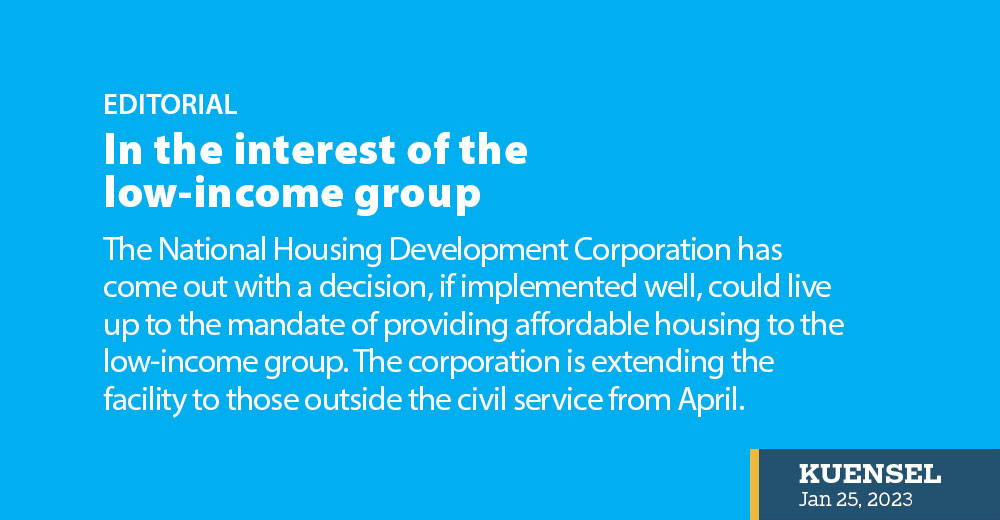The National Housing Development Corporation has come out with a decision, if implemented well, could live up to the mandate of providing affordable housing to the low-income group. The corporation is extending the facility to those outside the civil service from April.
Those working in the public and private sectors can also apply for a space in its property spread across the country. Extending the opportunity to those in the private sector would really help live up to the mandate of providing affordable housing. From the beginning, even if the intention was right, it defeated the purpose of a housing project that was meant to provide affordable housing for those who could not afford a house elsewhere.
There were accusations that when the apartments were finally allotted, it was not the low-income group that benefitted or that those who were allotted. It is true even today that most of the tenants, for instance at the Changjiji housing complex, are not in the low-income group. The allotment was done fairly, but those applying had tricks up their sleeves and cheated their way into the apartments. For instance, while the applicant was below the then civil service grade 10, the income of the spouse was not verified. This led to those at the higher rung of civil service occupying a low-income apartments.
Those who live in private buildings envy the Jiji residents. The rent is almost 200 percent higher. A common joke among Jiji residents is that the parking at the low-income housing colony is congested with Toyota Prados, Cretas, and Seltos. There are more low-income groups in the private sector – that earn between Nu 8,000 to Nu 10,000 and pay more than 70 percent of their salary in house rent or live in shanty apartments.
The NHDC will henceforth base the eligibility criteria on income and not grade. This could benefit the needy – those working in the private sector or the least paid in the civil service and corporations. However, determining income level, if not cautious, can be tricky. What if a husband earns Nu 10,000 a month in monthly salary and the wife Nu 30,000? The combined income should be taken to determine the income. That was the mistake in the past.
Perhaps, one way to benefit more people could be by reducing the number of years one could occupy an NHDCL flat. The current term of 10 years is too long leading to cheating the system. Bringing down the term to five years could let many save some from the skyrocketing house rent in urban Bhutan.
Meanwhile, as housing becomes a major problem in urban Bhutan, a long-term solution could be investing in low-income housing projects. This could expand beyond the NHDCL. Our housing loans are among the highest in the world which is driving the cost of housing. We have innovative schemes to encourage people to buy more cars, but not build houses at cheaper rates. In some countries, housing loans are provided for interest rates as low as one percent to keep a check on housing prices. The high lending rates are forcing owners to charge higher rates so they can pay banks the expensive loans.


